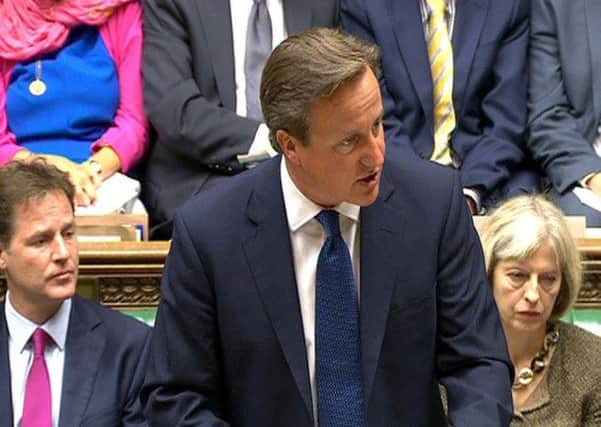Travel ban to target British jihadists


David Cameron unveiled a package of measures aimed at addressing what he described as the growing threat of terrorists inspired by the “poisonous ideology of Islamist extremism.”
Airlines will be forced to make flight and passenger information more readily available to the security services, police and border control officials will have greater powers to remove a suspect’s passport for at least 30 days and those identified as a threat by the police could be forced to leave their home town and banned from visiting certain associates.
Advertisement
Hide AdAdvertisement
Hide AdThe relocation orders come just two years after the Government dropped similar laws introduced by Labour. Mr Cameron said the Government would also enter into all-party talks looking at how to ban terror suspects from returning to the UK, saying it was “abhorrent” that British citizens were declaring allegiance to extremist groups. Announcing the moves, Mr Cameron said: “Adhering to British values is not an option or a choice. It is a duty for all those who live in these islands so we will stand up for our values, we will in the end defeat this extremism and we will secure our way of life for generations to come.”
The PM said it was wrong that those who travel to Syria and Iraq to fight for extremists groups are allowed to return to the UK even if they have made clear, as some have, that they are seeking to carry out atrocities in this country.
Plans to rip up passports for terror suspects face opposition from some Liberal Democrats, with former party leader Sir Menzies Campbell warning that removing someone’s citizenship could be illegal.
Deputy Prime Minister Nick Clegg insisted discussions on the measures had not “divided the coalition”.
Advertisement
Hide AdAdvertisement
Hide Ad“What we’ve done is targeted, proportionate and effective. We have continued to discuss and examined the way in which you can stop travelling from that crucible of violence in that region to come back here and do us harm,” he said.
Mr Clegg said other proposals were still being considered amid “all sorts of procedural, legislative, legal complexities”.
The Lib Dem leader added: “This was not an argument that divided the coalition. Both the PM and myself want to get the right balance between plugging the gaps where they need to be plugged to make sure that we keep people in this country safe, but doing so in a way that is in keeping with our finest traditions of due process and upholding the rule of law.”
The party has also briefed that even the relocation orders are so far only agreed “in principle”.
Advertisement
Hide AdAdvertisement
Hide AdLabour leader Ed Miliband said relocation powers were a central part of the control order system Labour introduced and the coalition scrapped, adding that proposals to ban British nationals from entering the country were “unclear”.